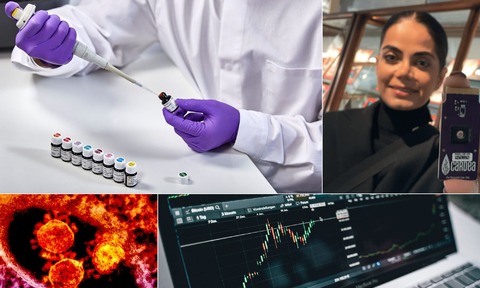LAB ROUNDUP 24 April – EU compliance, King's Award, multimillion pound grants and collaborations
23 Apr 2023

Beckman Coulter Life Sciences states it has achieved an industry first, by providing more than 270 reagents for flow cytometry that are In Vitro Diagnostics Regulation (IVDR) compliant – three years in advance of the EU deadline.
IVDR replaces the In Vitro Diagnostics Directive (98/79/EC) introduced in 1993 and is designed to ensure that IVD products achieve the highest levels of safety and efficiency. The change affects labs using Laboratory-Developed Tests (LDTs) or the ‘in-house IVDs’ that comprise a majority of clinical flow cytometry tests. Beckman Coulter Life has extended its network of certified manufacturing sites to include Marseille in France, O’Callaghansmills in Ireland, Suzhou in China; Bangalore in India and Miami, USA.
Brixham-based Scymaris and Digital Lab Consulting (DLC) are among the winners of the first King’s Award for Enterprise for International Trade. Based in Brixham, Devon Scymaris provides services to global agrochemical, pharmaceutical, industrial chemicals and biocides industries. DLC’s expertise is in digital transformation and innovation for life sciences. Overall, fewer than 150 organisations received this year’s King’s Award for Enterprise; formerly the Queen’s Award for Enterprise, this round is the first of King Charles’ reign.
CureSearch for Children’s Cancer, the US nonprofit announced funding for a project to study acute myeloid leukaemia (AML) in children. Although accounting for 20% of paediatric acute leukaemias, it is the leading cause of death in children diagnosed with the disease. CureSearch has already presented one of its Young Investigator Award – designed to fund young scientists to pursue key research – to Dr Elvin Wagenblast of the Mount Sinai Hospital’s Tisch Cancer Institute to develop treatment in cases where standard chemotherapy is ineffective. “Dr. Wagenblast’s research is unique, technical, and highly innovative,” said Holly Zink, Director of Research and Programs at CureSearch. “He is among very few investigators who have the potential to pursue this type of research to identify new therapeutic targets in this devastating type of paediatric leukaemia.”
The University of Glasgow in collaboration with the UK Health Security Agency (UKHSA) and UK Centre for Ecology & Hydrology (UKCEH) has been awarded a £1.25 million grant to investigate how climate change could increase the risk of mosquito-borne disease in Scotland. The three-year programme, funded by UKRI and Defra is part of a £7 million research support to tackle vector-borne disease and the first to assess the risk of mosquito-borne pathogen emergence in the country under several climate change scenarios. Vector-borne diseases worldwide cause more than 700,000 deaths and comprise more than 17% of all infectious diseases.
Cardea Bio Chief Scientific Officer Dr Kiana Aran’s CRISPR-chip has been selected to appear in the DHMD Museum in Dresden exhibition Of Genes and Human Beings, which highlights significant advances in the field of genetics over the last century. Said Aran: “It's not very common for scientists or academics to have their technology featured in a museum, so to see my technology being showcased next to Watson and Crick's DNA model is a proud moment in my career and I'm very happy to be a part of this exhibition.”
Innovate UK has awarded biotech Maxion Therapeutics £2 million in grant support the use of Maxion’s KnotBody platform to develop antibodies to treat autoimmune diseases (AID) with high unmet clinical need. The funding, is part of a £25 million investment in projects to support UK-firms develop innovative solutions for health challenges. In February, the firm completed a £13 million Series A financing, led by LifeArc with participation from Monograph Capital and BGF.
Automated tissue dissection solutions Xyall and computational pathology software and image analysis services company Indica Labs have formed a global strategic partnership. It will allow molecular laboratories a digital and automated workflow for tissue dissection for molecular diagnostic testing. The partnership plans to overcome what it said was the problem that tissue dissection limitations as a “manual, labour-intensive process, with limited precision and a high sensitivity to errors”.
Genmab and argenx have entered into a collaboration agreement to discover, develop and commercialise novel therapeutic antibodies with applications in immunology and oncology therapeutic areas. The aim is to accelerate the identification and development of novel antibody therapeutic candidates with to address unmet patient needs in immunology and cancer. The duo will both have access to each other’s suites of proprietary antibody technologies to identify lead antibody candidates against differentiated disease targets.

